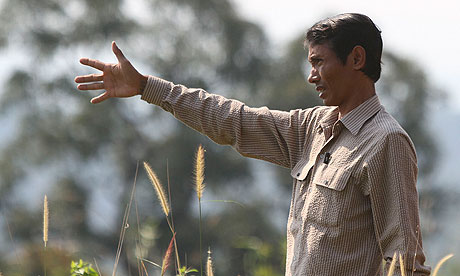Environmental activist Chut Wutty reportedly shot dead at police checkpoint after refusing to hand over evidence of illegal logging

Chut Wutty, director of the Natural
Resource Protection Group, at Botum Sakor national park in Koh Kong
province, where he exposed illegal logging and a secretive state
sell-off of national parks. Photograph: Samrang Pring/Reuters
A prominent Cambodian anti-logging activist, who helped expose a
secretive state sell-off of national parks, has been shot dead by
police in a remote south-western province while guiding journalists to
the scene of illegal logging.
A Cambodian human rights organisation, Licadho, said the confrontation occurred on Wednesday when Chut Wutty, director of the Phnom Penh-based environmental watchdog Natural Resource Protection Group, refused to hand over a memory card with photos taken in the nearby forest by him and two journalists from the Cambodia Daily newspaper.
Licadho said he had taken the journalists to see large-scale forest destruction and illegal rosewood smuggling near a Chinese-built hydroelectric dam in Koh Kong, and on the way out of the forest came to a checkpoint where military police demanded the memory card.
However, Colonel Kheng Tito, a military police spokesman, said a policeman was also killed and claimed that Chut Wutty had been armed. "We are investigating the incident so we don't have much detailed information," he said. "All we know is that our military policeman was doing his duty and encountered this person and there was gunfire."
He said: "Both sides were injured and later died in hospital."
Military police detained the two journalists, according to Kevin Doyle, the Cambodia Daily's editor-in-chief. He called for the safe return of Cambodian reporter Phorn Bopha, and Olesia Plokhii, a Canadian. The two were now "in the company of the army or military police in the forest", said Doyle.
Chut Wutty, who was in his forties and leaves a wife and two children, had a reputation for speaking out against logging and corruption by government and big business. He campaigned against the government's granting of so-called economic land concessions to scores of companies allowing them to develop land in national parks and wildlife sanctuaries.
He was particularly critical of Cambodia's military police, who are often deployed to protect private business interests.
Kheng Tito said his officer had encountered Chut Wutty while patrolling against "forest crimes".
He said: "Chut Wutty was also an activist against forest crimes; we don't know how it became like this."
The destruction of Cambodia's forests and the forced eviction of rural families by armed men connected to influential businessmen was "so sad", Chut Wutty told Reuters in February during an investigation in Koh Kong, near where he was shot.
Chut Wutty's death was a "tragedy," said Neang Boratino, a co-ordinator in Koh Kong province for the respected Cambodian Human Rights and Development Association (ADHOC). "This is a threat to all forestry activists who work for the preservation of the nature," he said.
Chut Wutty is the most prominent activist to meet a violent death in Cambodia since Chea Vichea, a union leader who fought for better pay and conditions for clothing workers until his 2004 assassination.
A Cambodian human rights organisation, Licadho, said the confrontation occurred on Wednesday when Chut Wutty, director of the Phnom Penh-based environmental watchdog Natural Resource Protection Group, refused to hand over a memory card with photos taken in the nearby forest by him and two journalists from the Cambodia Daily newspaper.
Licadho said he had taken the journalists to see large-scale forest destruction and illegal rosewood smuggling near a Chinese-built hydroelectric dam in Koh Kong, and on the way out of the forest came to a checkpoint where military police demanded the memory card.
However, Colonel Kheng Tito, a military police spokesman, said a policeman was also killed and claimed that Chut Wutty had been armed. "We are investigating the incident so we don't have much detailed information," he said. "All we know is that our military policeman was doing his duty and encountered this person and there was gunfire."
He said: "Both sides were injured and later died in hospital."
Military police detained the two journalists, according to Kevin Doyle, the Cambodia Daily's editor-in-chief. He called for the safe return of Cambodian reporter Phorn Bopha, and Olesia Plokhii, a Canadian. The two were now "in the company of the army or military police in the forest", said Doyle.
Chut Wutty, who was in his forties and leaves a wife and two children, had a reputation for speaking out against logging and corruption by government and big business. He campaigned against the government's granting of so-called economic land concessions to scores of companies allowing them to develop land in national parks and wildlife sanctuaries.
He was particularly critical of Cambodia's military police, who are often deployed to protect private business interests.
Kheng Tito said his officer had encountered Chut Wutty while patrolling against "forest crimes".
He said: "Chut Wutty was also an activist against forest crimes; we don't know how it became like this."
The destruction of Cambodia's forests and the forced eviction of rural families by armed men connected to influential businessmen was "so sad", Chut Wutty told Reuters in February during an investigation in Koh Kong, near where he was shot.
Chut Wutty's death was a "tragedy," said Neang Boratino, a co-ordinator in Koh Kong province for the respected Cambodian Human Rights and Development Association (ADHOC). "This is a threat to all forestry activists who work for the preservation of the nature," he said.
Chut Wutty is the most prominent activist to meet a violent death in Cambodia since Chea Vichea, a union leader who fought for better pay and conditions for clothing workers until his 2004 assassination.

No comments:
Post a Comment